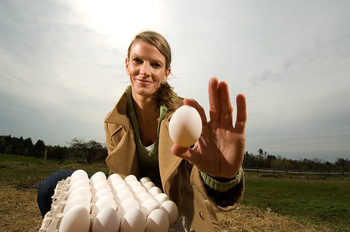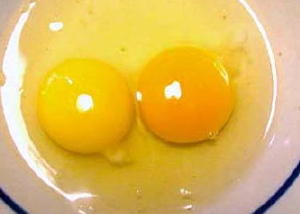The Sunny Side of Eggs
 "Despite decades of advice that the cholesterol in eggs is bad for you, researchers now report evidence that eggs might actually reduce high blood pressure.
"Despite decades of advice that the cholesterol in eggs is bad for you, researchers now report evidence that eggs might actually reduce high blood pressure.
The scientists found egg proteins that, in laboratory simulations of the human digestive process, seem to be as good as common prescription medications for lowering blood pressure.
"Eggs are one of the healthiest foods you can eat, and it’s a shame they’ve been vilified for so long in the United States. As a result, egg consumption has been going down for the last 40 years, all because of concerns about cholesterol.
But the idea that eggs are unhealthy is a complete myth, one that’s easily debunked if you look at the evidence.
In this latest study, researchers identified several different peptides in eggs that act as potent ACE inhibitors, which are drugs used to lower high blood pressure. This means they may actually lower your risk of heart disease, not raise it as health officials like to say they do.
One particularly skewed belief is that eggs are bad for your heart; however, eating eggs on a daily basis may prove to hold numerous health benefits, especially a decreased risk of heart disease.
Why Eggs Won’t Harm Your Heart
There is a major misconception that you must avoid foods like eggs and saturated fat to protect your heart. While it’s true that fats from animal sources contain cholesterol, this is not necessarily something that will harm you.
Cholesterol is in every cell in your body, where it helps to produce cell membranes, hormones, vitamin D and bile acids that help you to digest fat. Cholesterol also helps in the formation of memories and is vital for your neurological function.
As Ron Rosedale, MD, who is widely considered to be the leading anti-aging doctor in the United States, says: “First and foremost cholesterol is a vital component of every cell membrane on Earth. In other words, there is no life on Earth that can live without cholesterol. That will automatically tell you that, in of itself, it cannot be evil. In fact it is one of our best friends.
We would not be here without it. No wonder lowering cholesterol too much increases one's risk of dying. Cholesterol also is a precursor to all of the steroid hormones. You cannot make estrogen, testosterone, cortisone, and a host of other vital hormones without cholesterol.”
In other words, cholesterol is your friend, not your enemy.
And anyway, numerous studies have supported the finding that eggs have virtually nothing to do with raising your cholesterol. For instance, research published in the International Journal of Cardiology showed that, in healthy adults, eating eggs every day did not produce:
• A negative effect on endothelial function, an aggregate measure of cardiac risk
• An increase in cholesterol levels
So how did the notion that eating eggs will raise your cholesterol, and in turn raise your risk of heart disease, come about in the first place?" Read the rest at: http://articles.mercola.com/sites/articles/archive/2009/03/10/The-Sunny-Side-of-Eggs.aspx
______________
"Bert Seelman says that eggs are healthy and they can actually lower your cholesterol.Bert has had his clients using eggs for years without raising their cholesterol! Dairy is the problem with CHOLESTEROL! It is also how you prepare the eggs! Study out the make up of eggs for the truth!"
--------------------
"Bert Seelman explains how a study he conducted with clients' families showed that they could lower their cholesterol by eating 12-18 eggs per day. If you have high cholesterol, you need to see this information." For more info GO TO—
WWW.RESULTSAREPROOF.COM
_____________
Nutrition in the News: Egg Myths - Cholesterol & Good Chicken!
"Are eggs really too high in cholesterol, and is there truly a difference between free range chickens and eggs than commercially grown livestock."
___________________
Allergic to, or tired of eggs:
Local sources for free range eggs
http://www.localharvest.org/
__________________
Cooking a Naturally Healthy Egg
"When you cook eggs, don’t overheat the yolks. Heating will oxidize and damage the lipids/cholesterol. It’s far better to soft boil, poach, very soft scramble, or even eat them raw." From: http://heartspring.net/vision_natural_eyesight_improvement.html
_______________
Eggs and Cholesterol - Controversy and Deception
"Overheating the egg protein also changes its chemical shape, and the distortion can easily lead to allergies.Further, when an egg is overcooked, such as when it is scrambled, the cholesterol in it becomes oxidized, or rancid, and oxidized cholesterol can increase your levels of inflammation and lead to numerous health problems. So if you want to get the maximum health benefits that eggs have to offer, choose organic varieties and eat them raw. The next best would be soft-boiled and then sunny-side up, with the yolk still very runny.
When cooking an egg, the cholesterol in the yolk is altered when simultaneously heated and exposed to air. Therefore, eggs should be cooked without breaking the yolks (i.e. poached, boiled, over easy, etc.), instead of scrambled or made into omelets. Also in "To Your Health," 2002, Dr. Spreen says that the original researchers did not even use real, whole eggs: they used powdered eggs. The lecithin in the eggs had to be heated (altered before ever being used in the research), thus destroying the healthy, naturally protective lecithin only available in the real whole egg. From: {Health Scientist Panelist, Allan Spreen, MD, on e-Alert, April 3, 2003}
When one heats the egg yolk, changes occur in the fragile elements that serve to support the vital life force within the egg. The egg yolk, in many ways, is not very different from your own cells. Once your temperature goes above 105 degrees, you will start to suffer serious health problems. Similarly heating the yolk above 105 degrees will also start to cause structural changes in many of the highly perishable components in the yolk. The most obvious one is cholesterol. The more the yolk is heated, the more likely oxidation will occur. Our blood vessels do not have receptors for cholesterol, only for oxidized cholesterol. So, you can eat as many eggs as you like, without worrying about cholesterol, as long as you don't cook the yolks."
{"Biotin, the forgotten vitamin," mercola.com, July 2002} Editor's comment: Dr. Mercola's website is one of the most visited health sites in the world. From: http://www.jrussellshealth.org/cholesterol.html
______________
How to soft boil an egg
________________
Which came first, the chicken or the egg?

True free-ranging chickens
Free-range - Although technically “free-range” could just mean that the hens are out of a cage, these chickens usually have a covered shelter and access to an outside scratch yard, but may not necessarily go outdoors. They are usually fed conventional feed. Truly free-range chickens roam pastures and woodlands where they can get sunshine, worms and bugs, which is the ideal feed for health and strong immunity. Unfortunately, the only way one can really know how the chickens are raised is to visit the farm and see for yourself.
Organic - These chickens eat feed and grains that were not genetically modified or grown with pesticides. The hens may not be given any synthetic chemicals, antibiotics or hormones, and must have access to fresh air, but even "organic" hens are not required to be given access to the outdoors and sunlight. Picture a somewhat crowded building with a screen on one side. This can qualify as "organic" chicken housing. Generally the hens are fed vegetarian feed, which we disapprove of because chickens are omnivores and need some animal protein in their diet, like insects or worms. They also thrive on fresh green vegetation, which they may or may not be given in a "factory organic" farm.
Vegetarian fed - This may appeal to people who are vegetarians, but these eggs are not necessarily good for you. Chickens need protein to develop properly (that's why bugs are a part of their natural diet). Vegetarian fed does not necessarily mean organic, so there may be antibiotics, hormones, pesticides, genetically modified corn and GM soy. These chickens usually don't go outdoors, or if they do, it would mean a confined bare lot.
White vs. brown eggs - The shell color depends on the breed of chicken. Brown eggs are typically “farm” eggs and are more likely to be free-range and without antibiotics or hormones.
High Omega 3 - This simply means that a supplement such as flax seed oil is added to the regular feed which raises the omega 3 level. The chickens are usually commercially raised which means conventional feed, genetically modified corn and soy, pesticides, antibiotics and hormones. The overall nutrient content is ususally still sub-standard compared to organically fed, free-range chickens.
How can you tell a good egg?....
It is very easy - just look at the yolks. You are getting really healthy eggs if the yolks are bright orange yellow. Also when you break an egg open, the yolk and white will “stand up” higher from a fresh, healthy egg.
 Commercial egg yolk vs. free-range organic egg yolk
Commercial egg yolk vs. free-range organic egg yolk
If you are ever unsure about the freshness of an egg, just put it in a pan of plain water. If it sinks and rests horizontally, it's good. As it ages, the air cell inside gets bigger and the large end of the egg will begin to rise to a vertical position. If an egg is old, it will float on the surface and should not be eaten.
Blood spots occur when blood or a bit of tissue is released along with a yolk. As an egg ages, the blood spots become paler, so a bright red spot is an indication of freshness. Blood spots occur in less than one percent of all eggs laid, and may appear in a pullet’s first eggs, but are more likely to occur in aging hens. Eggs containing these spots are perfectly edible.
Nutrients and benefits....
Eggs are an ancient food. Man has always eaten the eggs of all animals that produced them: chicken, duck, goose, turtles, etc. Caviar and roe (the eggs from fish) are very special foods. Eggs are foods of reproduction and so therefore are good for our reproductive organs. They are very beneficial for pregnant and nursing woman.
 Eggs - a great source of nutrition, but not in an omelet or hard boiled.
Eggs - a great source of nutrition, but not in an omelet or hard boiled.
Eggs are an inexpensive and incredible source of high-quality protein, vitamins A and D, folic acid. phosphorus, sulfur and the adrenal-building minerals: choline, sodium and potassium. Eating eggs on a daily basis may prove to hold numerous health benefits, especially a decreased risk of heart disease.
Protect your eyes - The lutein found in eggs can help prevent macular degeneration. While most people associate carotenoids with vegetables, eggs are actually a very good source of lutein and zeaxanthin, which are yellow or orange carotenoids. These carotenoids are known to accumulate in the eye lens and macular region of the retina. Look for eggs with dark orange/yellow yolks.
Keep your brain healthy - Eggs are an excellent dietary source of choline, a dietary component essential for normal function of all cells and an essential nutrient for infant brain development. Impaired memory, difficulty concentrating and cognitive decline as we age are symptoms lacking this essential nutrient.
Improve heart health - Choline converts homocysteine into harmless material. Homocysteine is the substance that can damage your blood vessels and is a precursor to heart disease. Eggs can also decrease your risk for heart attacks and stroke thanks to the anti-clotting agent found in yolks.
Nourish expecting mothers and their babies - Egg yolks contain high levels of biotin, a B vitamin that can prevent birth defects. Egg yolks should be a baby's first animal food and can be introduced around six months.
Aid in fat assimilation - Eggs yolks contain lecithin. Lecithin is the precursor to choline, which helps lower serum cholesterol.
My doctor says I should watch my cholesterol.....
Do eggs adversely affect cholesterol levels? Most people would answer, "yes" without even thinking twice. However, this seems to be a popular misconception not supported by the evidence. It is now known that there is little if any connection between dietary cholesterol and blood cholesterol levels.
What researchers in previous studies never took into account while studying the link between bad cholesterol and eggs are the specific subclasses of LDL cholesterol. The smaller subfractions of LDL are more dangerous and associated with an increased risk of heart disease, while the larger ones are not dangerous.
Nutrient intake, egg intake, socio-demographic data and blood cholesterol levels of over 27,000 subjects were grouped according to the occurrence and frequency of egg consumption. Daily nutrient intake of people consuming eggs was significantly greater than non-egg eaters for all nutrients studied, except dietary fiber and vitamin B6.
They also note that dietary cholesterol was not related to serum cholesterol concentration. As a matter of fact, people who reported eating four eggs a week had a significantly lower mean serum cholesterol concentration than those who reported eating one egg a week.
There have also been a number of recent studies that have supported the idea that eggs do not increase your risk of heart disease. So rest assured, you can go ahead have your eggs, for they are one of the healthiest foods in the world.
What about salmonella?....
With all the warnings about salmonella, many people fear soft-cooked and raw eggs. The real key to avoiding the dangers of salmonella and other pathogens is in the inner ecosystem: yours AND the chicken who laid the egg. When you eat organic eggs from free-range pasture-fed chickens, they too have been following a healthy, natural diet of worms and bugs and microflora found in the soil. This diet builds a healthy inner ecosystem that can protect them from harmful pathogens.
The refrigeration myth....
The best way to purchase eggs is directly from the farmer, unwashed and unrefrigerated. Store them on top of your refrigerator, not in it. Eggs have a natural protective coating that helps them last longer if not washed off. Most of the world stores their eggs this way; they do not refrigerate them, and do not wash them until ready to use. Eggs can easily last a month or more unrefrigerated like this.

If you cannot find a farmer to sell you eggs directly, then organic eggs from the store would be your next best option. Refrigeration does allow them to last longer but they lose some of their nutritional value this way. Also conventional eggs from the store may have taken several weeks or more to get there, and they may have sat around for some time before they were even packed. The “packed-on” date doesn't necessarily mean they were laid that day.
The best way to eat eggs....
Our research shows that the best way to consume eggs is raw, as they are found in nature. Eggs generally are one of the most allergic foods that are eaten, but it is believed this is because they are cooked. If one consumes the eggs in their raw state the incidence of egg allergy virtually disappears. Heating the egg protein actually changes its chemical shape, and this distortion cannot be handled as well by your body leading to allergies.
It is advised to consume your eggs with as little cooking as possible. Remember that salmonella is not typically a problem if you are careful about the type of eggs you select.
If you just have to cook your eggs, the less you cook them the better, and under low heat. Valuable nutrients like lutein and other powerful antioxidants are destroyed when they are exposed to high temperatures." References....www.mercola.com - the #1 alternative health information resource on the web. www.westonaprice.org - The Weston Price Foundation.
__________________
On This Day:
Artificial-heart patient dies, Mar 23, 1983:
"On March 23, 1983, Barney Clark dies 112 days after becoming the world's first recipient of a permanent artificial heart. The 61-year-old dentist spent the last four months of his life in a hospital bed at the University of Utah Medical Center in Salt Lake City, attached to a 350-pound console that pumped air in and out of the aluminum-and-plastic implant through a system of hoses.
In the late 19th century, scientists began developing a pump to temporarily supplant heart action. In 1953, an artificial heart-lung machine was employed successfully for the first time during an operation on a human patient. In this procedure, which is still used today, the machine temporarily takes over heart and lung function, allowing doctors to operate extensively on these organs. After a few hours, however, blood becomes damaged by the pumping and oxygenation.
In the late 1960s, hope was given to patients with irreparably damaged hearts when heart-transplant operations began. However, the demand for donor hearts always exceeded availability, and thousands died every year while waiting for healthy hearts to become available.
On April 4, 1969, a historic operation was performed by surgeon Denton Cooley of the Texas Heart Institute on Haskell Karp, a patient whose heart was on the brink of total collapse and to whom no donor heart had become available. Karp was the first person in history to have his diseased heart replaced by an artificial heart. The temporary plastic-and-Dacron heart extended Karp's life for the three days it took doctors to find him a donor heart. However, soon after the human heart was transplanted into his chest, he died from infection. Seven more failed attempts were made, and many doctors lost faith in the possibility of replacing the human heart with a prosthetic substitute.
In the early 1980s, however, a pioneering new scientist resumed efforts to develop a viable artificial heart. Robert K. Jarvik had decided to study medicine and engineering after his father died of heart disease. By 1982, he was conducting animal trials at the University of Utah with his Jarvik-7 artificial heart.
On December 2, 1982, a team led by Dr. William C. DeVries implanted the Jarvik-7 into Barney Clark. Because Jarvik's artificial heart was intended to be permanent, the Clark case drew worldwide attention. Clark spent his last 112 days in the hospital and suffered considerably from complications and the discomfort of having compressed air pumped in and out of his body. He died on March 23, 1983, from various complications. Clark's experience left many feeling that the time of the permanent artificial heart had not yet come.
During the next decade, Jarvik and others concentrated their efforts on developing mechanical pumps to assist a diseased heart rather than replace it. These devices allow many patients to live the months or even years it takes for them to find a donor heart. Battery powered, these implants give heart-disease patients mobility and allow them to live relatively normal lives. Meanwhile, in the 1990s, the Jarvik-7 was used on more than 150 patients whose hearts were too damaged to be aided by the mechanical pump implant. More than half of these patients survived until they got a transplant.
In 2001, a company called AbioMed unveiled the AbioCor, the first completely self-contained replacement heart. Although patients implanted with the AbioCor have still eventually died, AbioMed has shown it is possible to live as long as 500 days with the implant. Scientists continue to look for ways to improve artificial hearts for long-term use."
___________
Yesterday:

We got the electric hedge trimmer out, and trimmed it down 
Inside that hedge is Misty's back yard, and the grass had grown, too. She doesn't like the long grass to tickle her derriere. The gas mower, which I just had fixed, wouldn't stay running, so it was the tiny electric mower that came to the rescue today.
















2 comments:
I don't think I've eaten a soft boiled egg in over 40 years. Now if I could just find a pin, I'd probably try to make one. :)
I love eggs, especially soft boiled ones. But, fix me eggs in any way possible and I will eat them for breakfast, lunch, and supper. Just love eggs.
Post a Comment